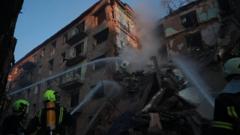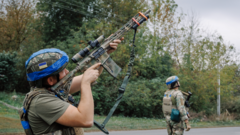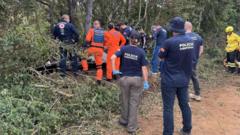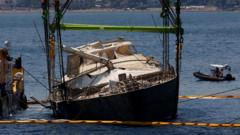In a show of solidarity, European allies have committed €21bn in military aid to Ukraine during a crucial period of the ongoing war, with focuses on air defense and new tech support. Leaders from various nations convened in Brussels to address the challenges posed by Russian advancements and to strategize future assistance.
European Allies Unite to Provide €21bn Military Aid to Ukraine Amid Ongoing Conflict
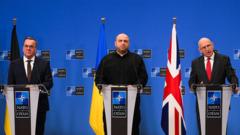
European Allies Unite to Provide €21bn Military Aid to Ukraine Amid Ongoing Conflict
The Ukraine Defence Contact Group pledges substantial military support as concerns rise over the protracted war and changing US priorities.
European allies of Ukraine have recently announced a substantial military aid package amounting to €21 billion (£18.2 billion) in a concerted effort to bolster support for Kyiv during what has been described as "a critical year" in the ongoing war. The announcement came during a meeting of the Ukraine Defence Contact Group (UDCG) at NATO headquarters in Brussels, where defense ministers from various countries gathered to reinforce their commitment to Ukraine amid shifting priorities from the United States.
Germany's Defence Secretary Boris Pistorius highlighted Berlin's intention to contribute €11 billion over the next four years, while UK Defence Secretary John Healey stated that these pledges would deliver a robust message to Moscow regarding the unwavering support for Ukraine. Despite speculation surrounding US President Donald Trump's sentiment for a ceasefire, European defense leaders expressed little optimism for a resolution to the conflict in the near future.
The new aid package also includes a £450 million commitment from the UK and Norway to provide crucial military equipment, such as advanced radar systems, anti-tank mines, and vehicle repairs, alongside hundreds of thousands of drones to enhance Ukraine's operational capabilities. This announcement is part of a larger framework in which the UK previously pledged £4.5 billion in military assistance for the year, with the latest funding being a significant addition.
Air defense was underscored as a pressing priority during the meeting, as Healey reported that Russian forces had unleashed over 10,000 glide bombs on Ukrainian territory within the first quarter of the year, particularly ramping up drone attacks. Reports suggest that the majority of battlefield casualties on both sides are now being attributed to drone warfare rather than traditional artillery.
While US Defence Secretary Pete Hegseth participated in the discussion remotely, it was reiterated by Pistorius that his presence reflected a continued commitment from the United States, despite the physical distance. During the meeting, Ukraine's Defence Minister Rustem Umerov expressed gratitude for European nations taking the lead in security assistance, acknowledging that US doors for dialogue remained open.
The discussions took place amid broader diplomatic efforts. A visit by US envoy Steve Witkoff to Russia aimed to engage the Kremlin in discussions about a potential ceasefire. However, Kremlin spokesperson Dmitry Peskov tempered expectations, indicating that no significant breakthroughs were anticipated from the meeting.
On the battlefield, reports from the Russian Defence Ministry confirmed the capture of the village of Zhuravka in Ukraine’s northern Sumy region, an assertion that Kyiv has yet to validate. President Zelensky warned of significant Russian troop deployments north of Sumy, with preparations for potential assaults on the city.
With the ongoing conflict and geopolitical uncertainties, the commitment from European allies represents a key effort to sustain military support for Ukraine and to deter Russian aggression in the region.






